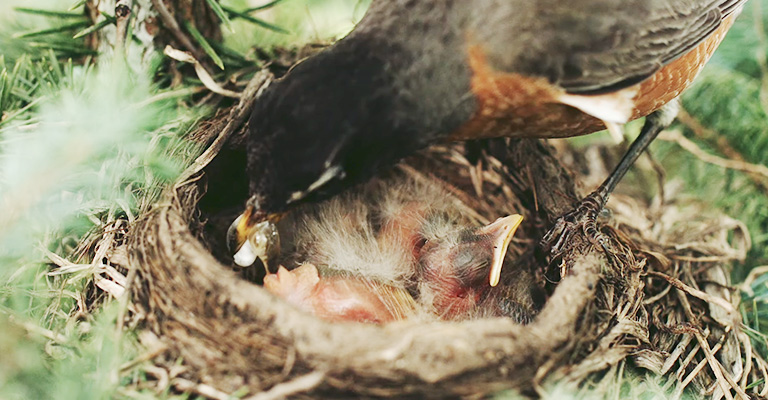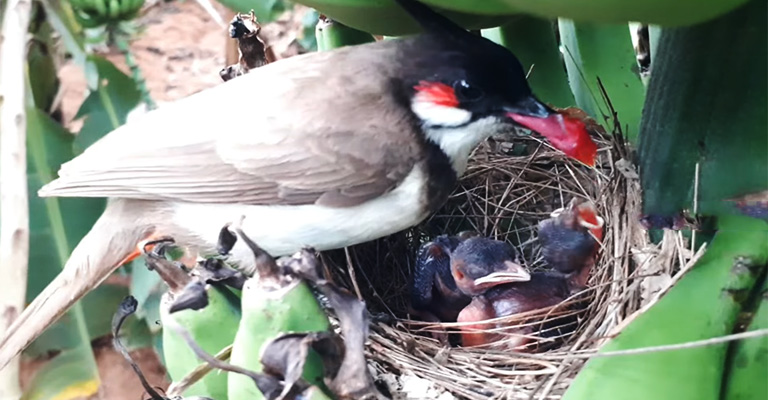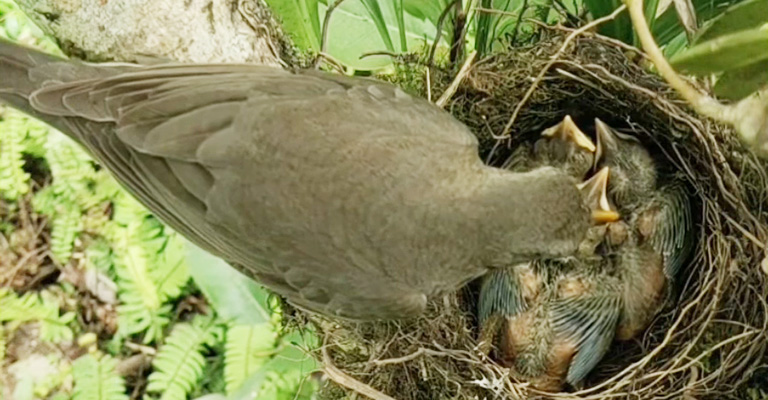In the intricate tapestry of nature’s maternal instincts, there are instances that might seem puzzling to human observers. Among these curious behaviors is the phenomenon of mother birds consuming their own chicks’ excrement.
This behavior, often referred to as “coprophagy,” raises intriguing questions about the interplay between survival strategies, nutrient conservation, and the delicate balance of providing for offspring.
While the act itself might appear counterintuitive, it is rooted in the intricacies of avian parenting, driven by an ancient and pragmatic biological impulse.
Exploring why do mother birds eat their babies poop unveils the remarkable adaptations that birds have developed to thrive in their unique ecosystems.

Why Do Mother Birds Eat Their Babies Poop? [9 Reasons]
Mother birds eating their babies’ poop, a behavior known as coprophagy, might seem unusual to us, but it serves various critical purposes in the avian world.
Here are nine reasons behind this behavior:
Nest Cleanliness
By consuming their chicks’ waste, mother birds help maintain a cleaner nesting environment. This reduces the accumulation of feces in the nest, which could attract parasites and pathogens that could harm the chicks.
Predator Deterrence
The scent of feces could attract predators to the nest. By consuming waste, the mother reduces the chances of drawing unwanted attention that might endanger the chicks.
Nutrient Recycling
The mother bird can regain valuable nutrients, such as calcium and proteins, from the excrement. These nutrients are essential for the mother’s own health and for producing future clutches of eggs.
Nest Hygiene
In confined nest spaces, waste accumulation could lead to bacterial growth and disease. Consuming feces helps prevent the growth of harmful pathogens that could affect both the chicks and the mother.
Reduced Nest Visits

Regularly leaving the nest to defecate can expose chicks to the risk of predation or adverse weather conditions.
Coprophagy allows the mother to remain in the nest, minimizing such risks.
Chick Health
By ingesting waste, the mother can help prevent any harmful effects that waste buildup might have on the chicks’ health, ensuring their optimal growth and development.
Natural Behavior
Coprophagy is a natural behavior that has evolved over time as an adaptation to the challenges of avian parenting.
It demonstrates the remarkable ways in which birds have developed strategies to ensure their offspring’s survival.
Energy Conservation
Foraging for food takes time and energy. By consuming readily available waste in the nest, the mother conserves energy that can be used for other important activities.
Minimized Disruption
Eating the chicks’ waste within the nest minimizes disturbances to the chicks’ daily routines. This ensures that they receive constant care and warmth from the mother without unnecessary interruptions.
In the grand scheme of nature, coprophagy highlights the intricacies of avian parenting, adaptation, and survival strategies. This behavior showcases the remarkable lengths to which birds go to ensure the success of their offspring in challenging environments.
What Other Animals Eat Their Babies’ Poop?

There are many animals that eat their babies’ poop, either for nutritional, digestive, or behavioral reasons. Some of the animals that do this are:
Rabbits
Rabbits produce two types of feces: hard pellets and soft cecotropes. The latter is rich in nutrients and bacteria that help the rabbits digest their food.
Rabbits eat their cecotropes directly from their anus, usually at night or early morning. This is called cecotrophy, and it is essential for their health.
Rodents
Rodents such as mice, rats, hamsters, and guinea pigs also practice coprophagy or eating feces.
They do this to obtain vitamins and minerals that are produced by the bacteria in their gut, especially vitamin B12. Rodents also eat their feces to stimulate their intestinal motility and prevent constipation.
Elephants
Elephant calves eat the feces of their mothers or other herd members when they are transitioning from drinking milk to eating solid foods.
This helps them acquire the beneficial bacteria that they need to digest the plant materials in their diet. Elephants also eat their own feces when they are stressed or lack minerals.
Hippos
Hippo calves also eat the feces of their mothers or other adults in the pod. This helps them develop their immune system and protect them from diseases.
Hippos also use their feces to mark their territory and communicate with each other.
Koalas
Koala joeys eat a special type of feces called pap, which is produced by their mothers during the weaning period.
Pap is soft and moist and contains bacteria and enzymes that help the joeys digest the eucalyptus leaves that they will eat as adults. Pap also helps the joeys develop a tolerance to the toxins in the leaves.
Pandas
Panda cubs eat the feces of their mothers or other pandas in the enclosure. This helps them obtain the microbes that they need to digest bamboo, which is their main food source.
Pandas also eat their own feces when they are sick or have digestive problems.
Dogs
Dogs may eat their own or other animals’ feces for various reasons, such as boredom, curiosity, hunger, stress, or health issues.
Some dogs may also eat feces to mimic their ancestors’ behavior of scavenging for food or hiding their tracks from predators. Dogs may also eat cat feces because they find it tasty or appealing.
Birds
Some birds, such as pigeons, chickens, and parrots, may eat their own or other birds’ feces.
They do this to obtain nutrients, minerals, or grit that help them digest their food. Birds may also eat feces to replenish their gut flora or to prevent infections.
Monkeys
Some monkeys, such as capuchins and macaques, may eat their own or other monkeys’ feces.
They do this to obtain nutrients, minerals, or fiber that help them digest their food. Monkeys may also eat feces to cope with stress, boredom, or social pressure.
These are some of the animals that eat their babies’ poop or their own poop.
Is It Safe For Humans To Touch Animal Feces?
No, it is not safe for humans to touch animal feces. Animal feces can contain harmful germs that can cause diseases in humans.
Some of these diseases are:
Toxoplasmosis
This is a disease caused by a parasite called Toxoplasma gondii, which can be found in the feces of cats and other animals. It can infect humans who come into contact with contaminated soil, water, or food.
Toxoplasmosis can cause flu-like symptoms, swollen lymph nodes, and eye problems. It can also be dangerous for pregnant women and people with weak immune systems.
Salmonellosis
This is a disease caused by bacteria called Salmonella, which can be found in the feces of many animals, especially reptiles, birds, and rodents.
It can infect humans who handle or eat contaminated animals or their products. Salmonellosis can cause diarrhea, fever, abdominal cramps, and vomiting.
It can also lead to serious complications such as dehydration, blood infections, and arthritis.
Campylobacteriosis
This is a disease caused by bacteria called Campylobacter, which can be found in the feces of dogs, cats, poultry, and other animals.
It can infect humans who come into contact with contaminated water, food, or surfaces. Campylobacteriosis can cause diarrhea, fever, abdominal pain, and nausea. It can also cause complications such as nerve damage, joint inflammation, and Guillain-Barré syndrome.
Leptospirosis
This is a disease caused by bacteria called Leptospira, which can be found in the urine and feces of rats, mice, dogs, cattle, and other animals.
It can infect humans who come into contact with contaminated water, soil, or food. Leptospirosis can cause fever, headache, muscle pain, jaundice, and kidney failure. It can also affect the liver, lungs, heart, and brain.
Toxocariasis
This is a disease caused by roundworms called Toxocara, which can be found in the feces of dogs and cats. It can infect humans who accidentally ingest the eggs of the worms from contaminated soil or surfaces.
Toxocariasis can cause coughing, wheezing, abdominal pain, and skin rashes. It can also affect the eyes and cause vision loss or blindness.
These are some of the diseases that humans can get from touching animal feces. To prevent them, you should always wash your hands thoroughly with soap and water after handling animals or their waste.
FAQ
Mother birds consume their chicks’ excrement as a survival strategy. By ingesting waste, they keep the nest clean and reduce the chances of attracting predators that might be drawn to the scent of their young.
No, not all bird species exhibit this behavior. Coprophagy is more prevalent among cavity-nesting birds like pigeons, doves, and some raptors, where nest cleanliness is crucial.
Yes, consuming feces might help the mother regain nutrients that are lost during egg-laying and incubation. It also reduces the need to leave the nest frequently to defecate, minimizing the risk of exposing the chicks to predators.
The consumed waste is broken down in the mother’s digestive system, and any useful nutrients are absorbed. The process ensures minimal disturbance to the chicks and maintains a cleaner nesting environment.
No, coprophagy performed by the mother bird does not harm the chicks. In fact, it benefits them by keeping the nest clean and reducing the risk of predation.
It’s a natural behavior evolved to enhance the chances of the chicks’ survival.
Conclusion
The seemingly paradoxical behavior of mother birds eating their chicks’ feces is a testament to the marvels of adaptation and survival strategies in the avian world.
Nature’s finely tuned mechanisms often transcend human understanding, reminding us of the diverse strategies that creatures employ to ensure the success of their offspring.
As we delve into these peculiar yet purposeful behaviors, we gain a deeper appreciation for the intricate balance of life and the remarkable ways in which every species navigates the challenges of parenthood and the quest for sustenance.
Coprophagy, in its natural context, serves as a vivid reminder that the complexities of the natural world are boundless and that every behavior, no matter how unconventional, plays a role in the grand symphony of life.